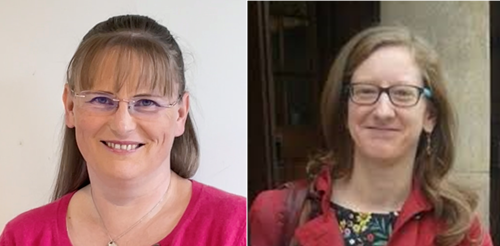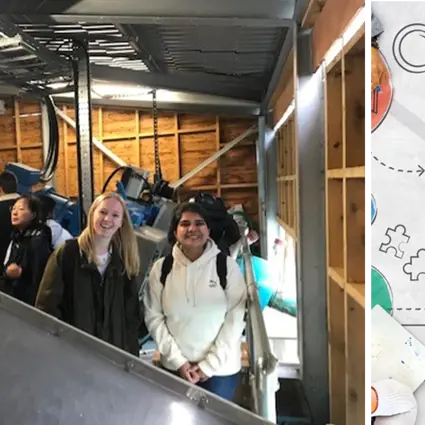Empowering generations to make a global transformation
Now preparing to enter its fifth year, the University of Oxford’s MSc in Energy Systems continues to be a globally recognised leader in its field. Delivered by the Oxford e-Research Centre in the Department of Engineering Science, with input from the School of Geography and the Departments of Physics, Materials, Science and Metallurgy, Chemistry, the course teaches students about the technical, social, economic and political aspects of this dynamic subject, and how to develop innovative solutions.
We talked to Deputy Course Director Dr Sarah Sparrow and MSc Programmes Administrator Dr Erin Nyborg to find out what it’s like being on the course.

Sarah: “It’s really competitive to get a place on the course; this year there were over 230 applications from all populated continents. David (Course Director Professor David Wallom) and I block a week off and do back-to-back interviews on Teams, about 70 in a week. We ask people to give an eight-minute presentation on an energy related topic, followed by questions about their presentation and other general questions. We find it encourages people to be very concise and organised and gives us a good feel for things.”
What kind of people come on the course?
Erin: “Perhaps because it’s an interdisciplinary programme with a large teaching contribution from Geography and a social science focus on economics, politics and policy factors, we have a fairly high proportion of female students who may not necessarily have studied engineering. We also get quite a lot of people who are coming back to study after several years in employment. They bring a lot of useful experience.”
Does everyone have an engineering background?
Erin: “We don’t require students to have a first degree in Engineering but we do require a first degree in one of the related subjects, so this could be geography, economics, any of the natural sciences, physics, chemistry.”
Because of the wide breadth of topics, there’s going to be something that’s challenging for everyone, which leads to a sharing of strengths and a strong sense of cohort identity.
“The week-long crash course in thermo-dynamics, for example, has become quite notorious for students who don’t have an engineering background. Everyone helps everyone out.”
The COVID pandemic struck during the first year. How did you manage?
Erin: “We were very lucky. We had completed all the taught modules when lockdown struck, so the student presentations in the third term had to change from in-person to video. This worked so well that we have continued to do them in this way. For the second cohort in 2020 we were able to hire a local Examinations hall where students could sit at two metre distance which meant we managed to keep most of the teaching in person that year. The students really appreciated it, they gelled really well as a group and kept each other going. We had no major covid outbreaks.”
“Another positive change that came out of the pandemic was the scheduling of one-off remote guest lectures and this is still happening. So students now have access, for example, to people speaking from 'Mitsubishi Heavy Industries in Japan and also a former energy minister from India.”
What makes the teaching special?
Sarah: “We include less conventional teaching alongside module lectures. For example they do a ‘small group case study’ in which we assign them each their own country. We ask them to imagine they are a small consultancy that has been engaged by the Ministry for Energy for that country, and they have to plan the national energy transitions. We set several criteria, for example the country has made commitments to reach ‘NetZero’ by 2050 and must be compliant with the ‘Paris Agreement’ goals, but they have to do this in an economically positive way.”
“We take care to divide the students up into groups with different disciplines, skills, backgrounds and gender. We choose these countries so they are not just developing countries, they might all have very different energy transition problems, so they might be more or less dependent on fossil fuels, they might be small island states.”
Our original plan was to invite members from the Embassies to come and listen to their presentations when they delivered them, now we have tried where possible to pass these videos on to people who would find them useful once marking is complete, rather than simply assessing them on the Masters Course.
“At the end of the taught elements of the course we ask all thirty students to work together as if they are a large consultancy. We work with external stakeholders to set a problem, then the students have to organise themselves to make sure they are working well together in order to meet their target. They have to give a presentation at the end of it, we ask the stakeholders to come along and watch. The students do all kinds of different things, for example hold panel discussions with Q&A sessions or produce posters. It has gone down really well with many of the stakeholders.”
During covid because it was too risky to involve a fully external stakeholder, we asked the group to review the University sustainability strategy. They did a really excellent job and some of their recommendations have been taken on board.
“Last year we worked with some of the University colleges on developing a toolkit to help them design a sustainability strategy. The colleges are a mix of a domestic and a working environment so they have a wide range of different challenges in terms of the energy strategy. This year they are working with an international external consultancy reviewing the Begbroke Innovation District masterplan. For future years we have had expressions of interest from large international companies who are interested in looking at the energy related problems they may be facing.”
What do students go on to do?
Sarah: “All of them have gone on to do something relevant to the course. A number have gone on to do doctoral studies, a number have gone on to consultancy work, some have begun their own start-up businesses, some have gone into international organisations such as the UN and the European Commission.”
Find out more
UK Research and Innovation announces £34 million to fund BioFAIR
Biological and biomedical sciences

